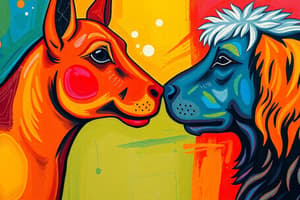Podcast
Questions and Answers
Classical conditioning refers to the process of an automatic, conditioned response that is paired with a specific stimulus.
Classical conditioning refers to the process of an automatic, conditioned response that is paired with a specific stimulus.
True (A)
Ivan Pavlov studied classical conditioning with detailed experiments with cats.
Ivan Pavlov studied classical conditioning with detailed experiments with cats.
False (B)
Pavlovian conditioning is the same as operant conditioning.
Pavlovian conditioning is the same as operant conditioning.
False (B)
Classically conditioned stimuli can reinforce operant responses.
Classically conditioned stimuli can reinforce operant responses.
Classical conditioning is a basic behavioral procedure that only applies to animals.
Classical conditioning is a basic behavioral procedure that only applies to animals.
Classical conditioning is also known as respondent conditioning and Pavlovian conditioning.
Classical conditioning is also known as respondent conditioning and Pavlovian conditioning.
Ivan Pavlov studied classical conditioning with detailed experiments with cats.
Ivan Pavlov studied classical conditioning with detailed experiments with cats.
Pavlov observed that the experimental dogs salivated when fed red meat, which led to the study of digestion.
Pavlov observed that the experimental dogs salivated when fed red meat, which led to the study of digestion.
Classical conditioning is the process of a voluntary, conditioned response that is paired with a specific stimulus.
Classical conditioning is the process of a voluntary, conditioned response that is paired with a specific stimulus.
Classically conditioned stimuli can reinforce operant responses.
Classically conditioned stimuli can reinforce operant responses.
Who is known for studying classical conditioning with detailed experiments with dogs?
Who is known for studying classical conditioning with detailed experiments with dogs?
What type of conditioning is distinct from classical conditioning?
What type of conditioning is distinct from classical conditioning?
What is paired with a neutral stimulus in classical conditioning?
What is paired with a neutral stimulus in classical conditioning?
What did Pavlov observe that led to the study of digestion?
What did Pavlov observe that led to the study of digestion?
What can affect operant conditioning?
What can affect operant conditioning?
Flashcards
Classical conditioning
Classical conditioning
An automatic, conditioned response paired with a specific stimulus.
Classical conditioning
Classical conditioning
Also known as respondent or Pavlovian conditioning.
Operant conditioning
Operant conditioning
A type of learning where behavior is controlled by consequences.
Classical conditioning
Classical conditioning
Signup and view all the flashcards
Pavlov's observation
Pavlov's observation
Signup and view all the flashcards
Ivan Pavlov
Ivan Pavlov
Signup and view all the flashcards
Conditioning interaction
Conditioning interaction
Signup and view all the flashcards
Study Notes
Classical Conditioning
- Classical conditioning is a process where an automatic, conditioned response is paired with a specific stimulus.
- Ivan Pavlov is known for studying classical conditioning with detailed experiments with dogs, not cats.
- Classical conditioning is also known as respondent conditioning and Pavlovian conditioning.
Key Differences
- Classical conditioning is distinct from operant conditioning.
- Classical conditioning involves automatic responses, whereas operant conditioning involves voluntary responses.
Pavlov's Experiments
- Pavlov observed that the experimental dogs salivated when fed red meat, which led to the study of digestion.
- Pavlov's experiments involved pairing a neutral stimulus with an unconditioned stimulus to elicit an unconditioned response.
Interaction with Operant Conditioning
- Classically conditioned stimuli can reinforce operant responses.
- Operant conditioning can be affected by classical conditioning.
Studying That Suits You
Use AI to generate personalized quizzes and flashcards to suit your learning preferences.




